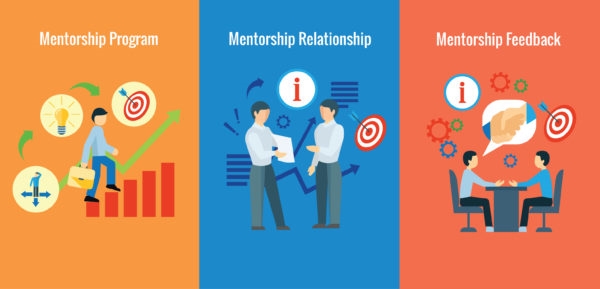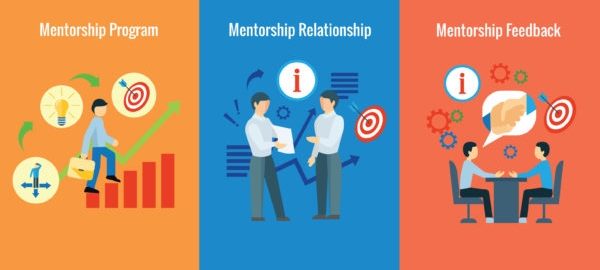— December 13, 2017

Channeling energy into helping more junior colleagues prosper is an expectation within many organizations. Mentors have four key roles:
- Acting as a sounding board, offering impartial advice and support
- Guiding, based on greater experience
- Opening doors with introductions
- Providing feedback
There is an emotional component to successful mentoring. Although mentoring should not to be confused with friendship, an alliance is forged as the mentee learns to trust the unique and confidential nature of the relationship.
Mentoring versus Coaching
Let’s examine the subtle but fundamental differences between Mentoring and Coaching.
The role of Mentoring:
- Long-term and relationship-based
- Development driven to prepare for future roles
- Extends beyond specific learning priorities to deal with personal presence: notably, self-assurance, self-confidence and self-esteem
The role of Coaching:
- Task or performance driven
- Often dedicated to acquiring or enhancing a specific skill or competency, for example, making presentations or preparation for a particular speaking engagement
- Once the skill is achieved, the coaching period ends
Successful mentorship takes place in a climate of trust
The mentor’s role is to ask questions. The goal is to stimulate mentees to self-diagnose their goals and opportunities. This is another example of what differentiates mentoring from coaching. The tennis coach may concentrate on improving his protégé’s serve while the business coach may be focused on developing the negotiation skills. Where the coach is detail-oriented or task-specific, the mentor is thinking long-term. And that’s why questions come into play. Not just the proverbial, “Where do you see yourself in five years?” — but absolutely variations on this theme:
1. “What do you really want to do?”
2. “What are your greatest skills?”
3. “Where do you think you need to grow?”
Your role as a mentor
There are two types of mentoring relationships:
- Formal, often assigned through the organization
- Informal, typically unstructured
Regardless of your relationship, there are 6 key things to keep in mind:
1. Work-life balance
This is possibly one of the stickiest topics, especially if your idea of mentorship is strictly career-focused. Be careful not to eliminate all personal issues. Often, behaviors or patterns from a mentee’s personal life impact professional advancement. Consider, for example, a mentee in a tense personal partnership who overreacts to stress at work by lashing out.
2. Set boundaries
Simply put, there may be some topics you’re not comfortable discussing. Make this clear.
3. Structure timeframes for meetings
Whether you’re officially appointed or an informal “volunteer,” the most successful mentorships often are based on pre-arranged meetings. This allows the mentee to formulate questions and provides a safety net that doesn’t leave the mentee hanging. It also discourages an open door where the mentee thinks it’s fine to interrupt your day.
4. Observe
Make it a point to attend events together and to introduce people. Use these situations to gauge your mentee’s poise, social adeptness and networking skills, in order to provide constructive feedback.
5. Be curious
Remember, your role is to ask questions. Not in the sense of interrogating but to learn about your mentee. This allows your experience and intuition to kick-in. It also includes your first impressions about what’s not being said.
6. Resist solving problems
Your role is to help your mentee “discover” how to resolve challenges, not to provide a solution, as tempting as this is.
When leaders share their experience they equip people to prepare for more senior roles. The mentee discovers a greater sense of self-awareness as they learn to share their apprehensions, as well as their dreams and goals. Mentorship, in many organizations, contributes to heightened innovation as aspiring, new leaders develop the assurance to participate with greater commitment.
Business & Finance Articles on Business 2 Community
(66)
Report Post







